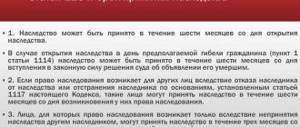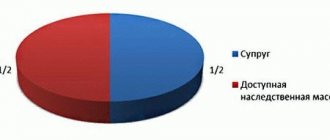What is acceptance of inheritance?
What is receiving someone else's property through inheritance? This is a procedure that involves the transfer of rights to property from the testator to the heir, subject to compliance with the articles of the law on inheritance.
The procedure for a person to enter into inheritance rights involves acting on one’s own behalf, with the ability to agree, accepting property rights that came with the death of a relative, or to renounce them.
Important! The succession of the inheritance occurs only in full; the person receives savings, other valuables, and debt obligations left unfulfilled by the testator.
Legislative norms determine a person’s rights to receive valuables. If desired, the subject refuses to receive succession (if he does not agree to pay the debts of a deceased relative). The successor simply does not visit the notary within the six months required to obtain such rights, as a result of which the valuables are transferred to other legal successors, according to the queue established by law.
The acquisition of valuables under any conditions is prohibited; a person receives absolute rights to all objects or nothing.
General information
To acquire an inheritance, the heir must accept it. To acquire escheatable property (Article 1151), acceptance of an inheritance is not required.
Acceptance of an inheritance is a unilateral volitional action of a person called to inherit, aimed at acquiring the inheritance due to him, carried out in the prescribed manner, within the time frame and in the ways determined by law.
The inheritance can be accepted by the heirs
The inheritance can be accepted by heirs called to inherit by will and (or) by law. Persons who may be called to inherit are indicated in Art. 1116 of the Civil Code of the Russian Federation. Acceptance of an inheritance is the right of the heir. The heir also has the right not to accept the inheritance or refuse it.
An accepted inheritance is recognized as belonging to the heir from the date of opening of the inheritance, regardless of the time of its actual acceptance, as well as regardless of the moment of state registration of the heir's right to inherited property, when such a right is subject to state registration (clause 4 of Article 1152 of the Civil Code of the Russian Federation).
Ways to accept an inheritance
Obtaining the opportunity to own the property of a deceased relative is possible after the subject has acquired the actions provided for by the legislative framework.
Methods for accepting an inheritance vary:
- notarial, in the presence of a will, or according to the methods established by law;
- through actual management and ownership of values.
When there are several legal successors, each of them has the right to independently exercise their will: agree to formalize the succession, or renounce this power. The person receives property, as well as debts, if any.
By will
Notarized wills are considered the best way to confirm the powers of the successor according to the property left to him by the testator.
The testator, when creating such a document, determines the conditions that are significant for him:
- to which successors the values will go (any persons are indicated who do not necessarily have family ties with the testator, having any gender, age, citizenship of any country): cases are not uncommon when completely strangers become heirs, while relatives are deprived of the right to inherit. An exception will be made for subjects who have the authority to acquire the obligatory part of inherited values, amounting to more than half of the share provided by law (for minor relatives, as well as persons who do not have the opportunity to work due to certain circumstances);
- what kind of property will go to a specific person;
- proportions of division of objects in the presence of several heirs;
- conditions for obtaining possessions.
Obtaining property according to the grounds of a will is possible when there is a notarized document reflecting the last will of the deceased person. Several such documents can be left; the last one will be considered legitimate. The paper must be in written form, supported by the signatures of the testator and the authorized person, and the seal of the notary’s office.
Restrictions on the testator’s freedom of expression of his own will relate to the following conditions:
- allocation of a mandatory portion of property to persons under the age of majority;
- mandatory acquisition of a share of the succession by persons who are disabled during the last year, living together with the testator, when they were completely on his financial support (spouses, parents, other dependents).
The will is irrevocable; if the rights of these categories are violated, the receipt of values, according to the document, becomes possible after the distribution of a share to the relatives, determined according to legal grounds.
In law
The Civil Code reserves the right to divide the property of a deceased person among several heirs, according to the law, subject to the following conditions:
- the deceased person did not write a will;
- the document left by the testator was declared invalid;
- the paper contains orders only regarding part of the property of the deceased;
- the heir indicated in the text does not agree to receive such rights;
- the heir under the will died before acquiring inheritance rights.
The legislation of the Russian Federation determines the totality of persons who have hereditary powers:
- First priority: children, relatives or those who have undergone the adoption procedure, as well as those born after the death of the testator, spouses, parents or adoptive parents of the testator. Management of assets inherited by minor successors is carried out by their legal representative.
- The deceased subject's siblings and grandparents. This queue receives rights on the condition that no one from the first was able to obtain rights, refused them, or was deprived according to legal grounds.
- Uncles and aunts, great-grandparents. Each person has the same rights and acquires equal shares of the inherited property. With the exception of the inheritance received by the spouse of a deceased person, when his share is initially established, then the remainder is divided equally among other legal successors.
Mandatory part of the inheritance
The persons to whom the inheritance is transferred may be:
- Minor children.
- Disabled spouse.
- Parents who have retired and are disabled.
- Dependents.
According to the paragraphs of the civil code, these people have the right to inherit the property of the deceased in the amount of 50% of the share that would be calculated if they had to inherit according to the letter of the law. This part is called the obligatory share.
The spouse who survived the testator, according to the will, also has the right to receive part of the property, because it was acquired by him together with the deceased person. This property is considered mutually acquired during their lifetime. The share that belongs to the deceased spouse is determined by law, very clearly stated in the civil code. This share is part of the inheritance, and it is given according to the rules established by the Code.
To receive what is due, each heir is obliged to accept it. This means that he fully assumes all inheritance due. And it doesn’t matter at all where it will be located or what it will look like.
If inheritance occurs according to several grounds (by law, by will or by inheritance), then the property can be accepted on one point or on several at once. Sometimes all bases are taken into account.
When an inheritance is accepted, it is strictly forbidden to have any reservations. The heir becomes the owner of the property from the day this inheritance was opened. Its actual acceptance is not important; the time of state registration, that is, the time of obtaining the right to inherit property, is also ignored.
The procedure for accepting an inheritance
The procedure and terms for accepting an inheritance are specified by legislative acts; they can be established by testamentary disposition. The procedure has minimal differences in the documents submitted:
- heirs receiving rights under the will must provide this paper;
- legal successors - confirm the presence of family ties, these are the determining grounds.
Legal, testamentary successors can follow the algorithms established by law: property can be received on legal (by contacting notaries), factual (during the performance of actions confirming the very fact of accepting the inheritance) grounds.
Persons established by the order of inheritance, as well as other applicants, after receiving a written will, begin collecting supporting documents to present their own powers.
Submitting an application to a notary
First of all, a subject who has expressed a desire to obtain property rights must contact an employee of a notary office. This will be an institution related to the place of residence of the deceased subject or the area where his property is located.
An application for acceptance of possession must be in simple written form and contain information:
- name of the notary institution;
- surname, name, patronymic of the heir, testator, as well as their place of residence;
- dates of birth and death of the testator;
- place and date of opening of the inheritance case;
- description of the property constituting the estate, its estimated parameters, characteristics (provided that they are known to the successor);
- intention to alienate possessions, property rights;
- designation of methods (legal or testamentary) of inheritance of values;
- time, date when the document is submitted;
- successor's signature.
The application can be submitted not only in person, by directly contacting a notary, but by sending a registered letter (when the office is located in another city) or transferring the right to represent oneself to a trusted person (with notarization).
Actual acceptance of inheritance
The fact of acceptance of an inheritance is not necessarily formalized by law; some cases make it possible to confirm the fact of inheritance by performing actions recognized as the actual acceptance of an inheritance.
Legislative practice allows you to obtain powers in two ways:
- legal transaction : a citizen performs the actions necessary to acquire the appropriate certificate from a notary, after which he receives the authority to own property;
- by actual actions the subject confirms that he owns and manages the property transferred to him after the death of the original owner. The path involves acquiring a court decision with the provision of certificates and invoices confirming his actions in property management.
If a case arises when the existing deadlines for acquiring the inheritance have already passed, the subject still has such a right. The main thing is to provide documents confirming that the missed deadlines occurred for valid reasons:
- within six months, after the death of the testator, the successor must take actions confirming his desire to become an heir. This includes moving into a deceased relative’s apartment, repaying the deceased’s loan obligations, repairing a garage, and more. Such actions can be carried out by the subject, as well as third parties;
- preserve any documentation confirming the activities related to the actual receipt of the inheritance (agreements, paid bills, certificates);
- submit documents to a notary, submit an application for a desire to receive a certificate of inheritance;
- pay the state fee;
- receive the document.
Important! The expired entry period can be extended according to a court decision; to obtain the latter, you must submit a statement of claim and submit the necessary documentation.
Acceptance procedure
According to the order, the acceptance procedure looks like this:
- prepare documents and provide them to a notary (passport, certificate confirming the death of a relative, certificates of his last place of residence, deregistration, will, documents on family ties, title documentation of property - cadastral, appraisal, technical, registration);
- assess the value of the property;
- pay the duty, it is based on the valuation of the property: close relatives pay 0.3%, and distant relatives - 0.6% (when the heirs lived with the testator before and after his death, they are exempt from paying the duty);
- receive a document;
- register the right to property, obtain an extract from the Unified State Register of Real Estate.
From the moment the succession is opened, the citizen becomes a full heir, provided that he has not formalized a refusal of the inheritance.
As a general rule, an inheritance can be accepted within
» Controversial issues September 03, 2020
Inheritance law. Test 2
1. A certificate of the state’s right to inheritance is issued on the day the will is announced three days after the death of the testator after 6 months from the date of opening of the inheritance on the day of opening of the inheritance
2. Heirs of the second priority are called upon to inherit by law if there is an expression of will of the heirs of the second order, if there is a will by agreement between the heirs, in the absence of heirs of the first order or if they do not accept the inheritance, and also if the heirs of the first order are deprived by the testator of the right to inherit
3. Extension of the established period for accepting an inheritance can be done by the court, carried out by a notary at the request of the heirs, not allowed if such a condition is in the will
4. The state to which the inherited property was transferred is not liable for the debts of the testator; it is responsible within the limits of the value of the entire estate determined in the will; it is liable with all its property; it is liable within the limits of the actual value of the property transferred to it.
5. As a general rule, an inheritance can be accepted within ten years from the date of opening of the inheritance twelve months from the date of opening of the inheritance five years from the date of opening of the inheritance six months from the date of opening of the inheritance
6. A foreign citizen cannot be an heir under a will; can only be if there is an appropriate international agreement; can only be if there are family relations with the testator
7. The clause on the irrevocability of a will is a valid, voidable, imaginary transaction void
8. Is a “closed will” allowed under current legislation, when the testator does not provide the notary and other persons with the opportunity to familiarize themselves with its contents, yes only if the testator is fully capable no
9. Of the listed methods of making transactions, a will can be executed by the following(s) by proxy through a representative acting in person on the basis of the law
10. The heir by law can be legal entities, adult citizens, individuals and the state, any person
11. A. bequeathed his house to M. and all other property - O. M. renounced the inheritance in favor of the state. The house passes to the heirs of the first stage O. state heirs by law
12. The imposition by the testator of the responsibilities of property order on the heir is called inheritance by representation of the testamentary refusal of the estate by hereditary transmission
13. The rules on restoring the statute of limitations for the time limits for filing claims by creditors of the testator do not apply; apply if we are talking about inheritance by will; apply; if we are talking about inheritance by law; apply
14. Partial renunciation of inheritance is allowed if we are talking about inheritance by law; allowed; allowed; if we are talking about inheritance by will; not allowed
15. Can intangible benefits be the subject of inheritance? No, but they can be protected by relatives
no Yes
Other entries from the category
Article 1154. Time limit for accepting an inheritance
1. An inheritance can be accepted within six months from the date of opening of the inheritance.
If an inheritance is opened on the day of the expected death of a citizen (clause 1 of Article 1114), the inheritance can be accepted within six months from the date of entry into legal force of the court decision declaring him dead.
2. If the right of inheritance arises for other persons as a result of the heir’s refusal of the inheritance or the removal of the heir on the grounds established by Article 1117 of this Code, such persons may accept the inheritance within six months from the date on which their right of inheritance arises.
3. Persons for whom the right of inheritance arises only as a result of non-acceptance of the inheritance by another heir may accept the inheritance within three months from the date of expiration of the period specified in paragraph 1 of this article.
Commentary to Art. 1154 Civil Code of the Russian Federation
1. After the opening of the inheritance, the property that belonged to the testator becomes subjectless. Therefore, there is uncertainty about whose things the testator now owns, who is the bearer of his rights, who should fulfill his duties. Accordingly, the debtors of the testator and his creditors experience difficulties. This situation should not exist for long, because due to the noted circumstances it has a negative impact on civil circulation as a whole. This is on the one hand. On the other hand, a certain period of time is necessary for the heirs to learn about the opening of the inheritance, for their will to become legal successors of the testator to be formed, for actions to be taken indicating acceptance of the inheritance (filing an application or actually accepting the inheritance - Article 1153 of the Civil Code).
The article in question establishes a period during which heirs who wish to become legal successors of the testator must express their will to accept the inheritance. This is the period during which the right of inheritance can be exercised. After this period, as is commonly believed, the right is terminated (preventive period). True, this is a strange termination of rights. Firstly, the court can restore the term. Secondly, with the consent of all heirs who accepted the inheritance, an heir who missed the deadline can accept the inheritance without going through the judicial procedure (Article 1155 of the Civil Code).
2. As a general rule, the period for accepting an inheritance is six months from the date of opening of the inheritance.
As is known, when a citizen is declared dead, the inheritance opens on the day the court decision enters into legal force, and if the day of the citizen’s death is recognized as the day of his presumed death, then on the day of death specified in the court decision (clause 1 of Article 1114 of the Civil Code). However, in both cases, the period for accepting the inheritance is calculated from the date of entry into force of the court decision declaring the citizen dead and is also equal to six months. At first glance, such an establishment of the moment when the period begins to run appears illogical for those situations where the inheritance opens on the day of the expected death. However, there is legal and everyday logic in this. Until the court decision to declare a citizen dead comes into force, the day of his expected death has not yet been established and he has not yet been declared dead. Consequently, the heirs cannot yet accept the inheritance (before the court decision comes into force). And if the period for accepting the inheritance was calculated from the date of the alleged death, then the heirs would generally be deprived of the opportunity to accept the inheritance, since in appropriate cases a citizen can be declared dead only after six months after he disappeared under circumstances threatening death or giving reason to assume his death from a certain accident (clause 1 of article 45 of the Civil Code).
3. For some heirs, the right of inheritance arises not from the date of opening of the inheritance, but later.
Thus, inheritance by law takes place when and insofar as it is not changed by a will, as well as in other cases established by the Civil Code of the Russian Federation (Article 1111). Therefore, if all the property of the testator is bequeathed in favor of one or several persons, then, as a general rule, only these persons have the right of inheritance. If these persons refuse to accept the inheritance, the rules on inheritance by law begin to work, and the right of inheritance appears to the heirs by law. They can accept the inheritance within six months. The period must be calculated from the date their right of inheritance arises. Such a day in this case is the day of refusal of inheritance by the person to whom the property was bequeathed.
The same rules apply in other cases when someone has the right to inherit as a result of the heirs’ refusal to accept the inheritance (if the heir specified in the will refuses the inheritance, then within the specified period the inheritance can be accepted by the designated heir if, when inheriting by law, all heirs of the previous line have refused the inheritance, then the right of inheritance of the next line arises, which can be exercised within the specified period).
It seems that it is more difficult to determine the beginning of the period for accepting an inheritance if there are circumstances provided for in Art. 1117 of the Civil Code of the Russian Federation, which is referred to in paragraph 2 of the commented article. In paragraph 1 of Art. 1117 of the Civil Code of the Russian Federation names persons who do not inherit either by law or by will. Consequently, they do not have the right of inheritance; such a right from the date of opening of the inheritance arises for other heirs (sub-designated heirs, successive heirs). From this day the six-month period for accepting the inheritance begins. If the court excludes from inheritance by law citizens who have maliciously evaded fulfillment of duties to support the testator, then in the absence of heirs in the same line as the citizen excluded from inheritance, the right to accept the inheritance arises from the heirs of the next line. This right arises from the moment the court decision on exclusion from inheritance comes into force. It is from this day that the six-month period for accepting the inheritance should be calculated.
4. Non-acceptance of an inheritance occurs when the heir is inactive (he does not refuse the inheritance, but does not accept it either) (see commentary to Article 1152 of the Civil Code). The heir may accept the inheritance at any time within six months from the date he acquired the right to inherit, including on the last day of this period. This means that it can be stated that the heir did not accept the inheritance only after this period had expired. The right of inheritance arises for other heirs: for a sub-designated heir under a will, if the heir under the will did not accept the inheritance from the heirs by law, if the heirs by law did not accept the inheritance from the heirs of the next priority, if the heirs of the previous order did not accept the inheritance.
These persons can accept the inheritance within three months from the end of the six-month period from the date of opening of the inheritance.
During hereditary transmission, if after the death of the heir part of the period established for accepting the inheritance is less than three months, it is extended to three months (see Article 1156 of the Civil Code and the commentary thereto).
Deadline for accepting inheritance
1. Actions for accepting an inheritance are carried out within the time limits established by law; the period for accepting an inheritance begins from the day specified in the law.
General period for accepting an inheritance
As a general rule, an inheritance can be accepted within 6 (six) months from the date of opening of the inheritance (Part 1 of Article 1154 of the Civil Code of the Russian Federation).
The day of opening of the inheritance is the day of the citizen’s death. When a citizen is declared dead, the day of opening of the inheritance is the day the court decision to declare the citizen dead comes into force. In the case of the alleged death of a citizen, the day of death is recognized as the day specified in the court decision (Article 1114 of the Civil Code of the Russian Federation), and therefore is the day of opening of the inheritance, however, the calculation of the six-month period in this case begins from the day the court decision enters into force (Clause 1 of Art. 1154 Civil Code of the Russian Federation). It should be assumed that in this case the law establishes a special approach for calculating the six-month period.
General rules for calculating deadlines are provided in Chapter. 11 of the Civil Code of the Russian Federation.
In Art. 191 of the Civil Code of the Russian Federation provides for the beginning of a period defined by a period of time, which begins the next day after the calendar date or the occurrence of an event that determines its beginning. Consequently, the period established for acceptance of an inheritance, as a general rule, begins the day after the day of opening of the inheritance, and with special deadlines for accepting an inheritance - the next day after the occurrence of the event, i.e. after the day from which the heir's right of inheritance arose.
Since the period calculated in months, according to Art. 192 of the Civil Code of the Russian Federation (clauses 1 and 3), expires on the corresponding date of the last month of the period, the period for accepting an inheritance, as a general rule, expires on the corresponding date of the sixth month. For example, the testator died on January 18, 2010. The period for accepting the inheritance began on January 19, 2010. Therefore, the six-month period for accepting the inheritance expires at 24 hours on July 19, 2010.
If the end of the period established for accepting an inheritance falls on a month in which there is no corresponding date, then the period expires on the last day of this month (paragraph 3 of clause 3 of Article 192 of the Civil Code of the Russian Federation). For example, the death of the testator occurred on March 30, 2010. The period for accepting an inheritance begins to run on March 31 of this year, since the six-month period expires on the 31st, and in September there is no such date, which means that the last day of the period for accepting an inheritance is September 30, 2010 G.
If the last day of the period falls on a non-working day, the end of the period is considered to be the next working day following it (Article 193 of the Civil Code of the Russian Federation). Non-working days are considered to be weekends and non-working holidays (Articles 111 and 112 of the Labor Code of the Russian Federation). When accepting an inheritance on the last day of the term, the inheritance is recognized as accepted on time:
- if the application for acceptance of the inheritance is submitted personally to the notary before the end of his working day on the last day of the term
- if the postal item with the heir’s application for acceptance of the inheritance is delivered to the communications organization before twenty-four hours of the last day of the deadline, even if it was received by a notary after the expiration of the period established for acceptance of the inheritance (Article 194 of the Civil Code of the Russian Federation).
Special deadlines for accepting an inheritance
Special deadlines for accepting an inheritance are established by law for cases where the right of inheritance does not arise from the moment the inheritance is opened.
When can an inheritance be accepted?
Deadlines are one of the main components in inheritance law. In particular, if you do not comply with the time frame of the inheritance process, you can significantly complicate the process of its implementation. The legislation provides for different periods for accepting an inheritance, based on the circumstances affecting its duration.
Total term
The main principle of registering a legacy: its terms do not depend on how the succession is carried out - by law or based on the contents of the will.
If the successor is called to inherit on several grounds (according to the law, a will or as a result of transmission), he can exercise his rights under one of them or all at once.
The date on which the inheritance is considered open is the day following the day of death of the relative. This issue is regulated by Art. 1114 of the Civil Code of the Russian Federation. Representatives of the deceased are issued a medical report (certificate) containing the date and time of death, on the basis of which the exact date of opening the inheritance case becomes known. It is from this day that the report is taken, when the inheritance, as a general rule, can be accepted within six months.
If the testator was considered missing and his date of death was determined by the court, then the date of opening of the inheritance is set as the day on which the decision comes into force. The same rule applies when a judge sets the day of death of a relative.
Special dates
Rules of Art. 1154 of the Civil Code of the Russian Federation regulates the inheritance process in the event that the primary heir renounced his rights and was also removed by court as unworthy. In such a situation, the general period is extended by six months from the date the legal successor commits these actions.
An example would be circumstances where all participants in the previous line refused to participate and representatives of the next line are called upon by law to exercise their inheritance rights. In this case, the total period begins to count from the day when all participants in the first stage refused, or the last of them, if their refusals occurred at different times.
If the primary successor has not accepted his part of the inheritance, the duration of the exercise of the rights of the subsequent heir is 3 months from the date of expiration of the general period from the moment of death of the relative or the entry into force of the judge’s decision on his death.
Special deadlines also include the situation when the heir has not yet been born. The period of 6 months is then calculated from the date of his birth.
The duration of acceptance of property by inheritance transmission is equal to the remainder of the total period, but not less than 3 months from the date of opening the inheritance case.
Skip date
There are often cases when there is a will, but the deadline is missed. One of the reasons for this is the incorrect calculation of the period for accepting the inheritance.
The norms of the Civil Code of the Russian Federation establish that when a period consists of months, it ends on the corresponding date of the last month of the established period. For example, a relative died on January 4, 2017, then January 5, 2020 is the day the legacy was opened, therefore, 6 months expire at 24 hours on July 5, 2020.
If there is no suitable date in the month falling at the end of the term, then the period for accepting the inheritance ends on the last day of the month. For example, a relative died on December 30, 2020, the start of the period falls on December 31. There is no such day in June, so the end of the period will be considered the 30th of the month.
The last day for filing an inheritance application can only be a working day.
What to do if the deadline is missed? – Try to obtain the consent of other heirs to include another legal successor in the division of property.
If it is not possible to restore inheritance rights through conciliation, you can go to court, but only under the following circumstances:
- The presence of compelling reasons (serious health condition, being abroad with the inability to travel) or ignorance of the fact of death.
- No more than 6 months have passed since the reasons preventing the exercise of rights were eliminated.
Legal proceedings are opened based on a claim brought against all heirs participating in the inheritance case.
Acceptance algorithm
The implementation of inheritance rights is carried out through two methods, regulated by paragraphs 1-4 of Art. 1153 of the Civil Code of the Russian Federation.
The successor writes an application to the notary's office (another organization authorized by law) located at the place where the inheritance is being considered. The document can be drawn up as an application for receiving an inheritance or as a request for the issuance of a certificate confirming property rights to the inheritance.
Carrying out actions that will act as confirmation of acceptance of the inheritance:
If the heir submitted a corresponding application before the end of the last day of the term or took actions confirming the actual acceptance of inheritance rights, he is considered to have accepted it. From this moment on, the countdown of the allotted six-month period stops.
How long does it take to approve the law for registration of inheritance rights? – the period is not limited by time frame. The assignee may apply for a certificate of title to the property when he considers it possible or necessary. In this case, the property belongs to the heir, starting from the day the inheritance is opened.
Lawyer's comment
Article 1154. Time limit for accepting an inheritance
1. An inheritance can be accepted within six months from the date of opening of the inheritance. If an inheritance is opened on the day of the expected death of a citizen (clause 1 of Article 1114), the inheritance can be accepted within six months from the date of entry into legal force of the court decision declaring him dead.
2. If the right of inheritance arises for other persons as a result of the heir’s refusal of the inheritance or the removal of the heir on the grounds established by Article 1117 of this Code, such persons may accept the inheritance within six months from the date on which their right of inheritance arises.
3. Persons for whom the right of inheritance arises only as a result of non-acceptance of the inheritance by another heir may accept the inheritance within three months from the date of expiration of the period specified in paragraph 1 of this article.
At the time of opening of the inheritance, it is not yet known who will own it. The inheritance before its acceptance by the heirs or before its transfer as escheat into the property of the Russian Federation is a set of subjectless, i.e. rights and responsibilities that do not yet belong to anyone. A state of legal uncertainty arises that cannot be tolerated for long. An inheritance, if it does not have a real owner, can be stolen, no matter what measures are taken to protect it, the creditors of the deceased testator experience difficulties in exercising their rights, and his debtors often try to evade fulfilling their obligations. Ultimately, it is in the interests of civil law as a whole that the state of legal uncertainty that arose in connection with the death of the testator and due to the fact that no one took his place in the inherited rights and obligations should be overcome as soon as possible.
That is why the law establishes a relatively short period for accepting an inheritance. At the same time, the specified period, as a general rule, is quite sufficient for the heir to accept the inheritance or refuse it competently, having weighed all the pros and cons associated with a particular decision.
By virtue of the direct instructions of the law, the period for accepting an inheritance is six months, and its course begins from the day the inheritance is opened. In accordance with the general rules on the procedure for calculating deadlines, the six-month period for accepting an inheritance, as well as for refusing an inheritance, begins to run from the day following the day of the citizen’s death.
If a citizen is declared dead by the court due to his unknown absence, then the inheritance can be accepted within six months from the date of entry into legal force of the relevant court decision, at least the day of the citizen’s death is recognized in the court decision as the day of his alleged death.
In cases where the right of inheritance arises for other persons as a result of the heir’s refusal of the inheritance (for example, all heirs of the first stage of heirs by law have refused the inheritance and heirs of the second stage are called to inherit) or the heir’s removal from inheritance as unworthy by a court decision, these persons may accept the inheritance within six months from the date their right of inheritance arises. So, if we are talking about calling heirs to inherit according to the law of the second priority, then the right of inheritance arises for them from the day when all the heirs according to the law of the first priority renounced the inheritance. If their refusal of the inheritance occurred at different times, then the right of inheritance for the heirs of the second priority arises from the day when the last of the heirs of the first priority refused the inheritance. If the right of inheritance arises for other persons as a result of the exclusion of an unworthy heir from the inheritance, then the six-month period for accepting the inheritance begins to run from the day the inheritance is opened.
There may be cases when the right of inheritance for other persons arises due to the fact that the persons called to inherit did not accept it within the period established for accepting the inheritance. In other words, they did not directly refuse the inheritance, but at the same time they did not perform any actions that would indicate that they accepted the inheritance. In these cases, persons whose right of inheritance arises only after the expiration of the six-month period that the heirs initially called to inherit had for accepting the inheritance may accept the inheritance within three months from the date of the end of the specified six-month period.
Sources: dekane.ru, stgkrf.ru, www.delovoysoz.ru, prozaveshanie.ru, www.bez-nasledstva.ru
Next:
No comments yet!
Share your opinion
You might be interested in
Is it possible to challenge an inheritance after 3 years?
The obligatory share in the inheritance is at least
How much do you need to pay when receiving an inheritance under a will?
How to register an inheritance for your son
Popular
Within what period is a notary required to issue a certificate of right to inheritance (Read 364)
Inheriting an apartment with shares, new rules (Read 319)
If the mother is deprived of parental rights, does she have the right to inheritance (Read 154)
How to inherit a car if there are several heirs (Read 150)
Deadlines for accepting an inheritance
Acceptance of inheritance, methods and terms are clearly regulated by law. A citizen presenting such rights has six months to obtain them. This deadline begins to run:
- from the day the testator dies;
- from the moment when the court decision became legal (it may recognize the person as dead or missing).
When a person becomes a legal successor after the refusal of other heirs, by a court decision, after the exclusion of other subjects from participation in the inheritance, the deadlines are counted taking into account a number of circumstances:
- the day the other heir submitted the refusal application;
- the day the court decision to recognize another entity as an illegitimate heir or to remove him from inheritance comes into force;
- after the end of the six-month period, when other entities have not declared their rights (acceptance of the inheritance is carried out within 90 days).
Missing deadlines does not entail a complete loss of property; a person can always restore his rights:
- confirmation by the judicial authorities of the validity of the reasons;
- reaching an agreement with other subjects of inheritance on the redistribution of shares based on newly discovered circumstances.
How to receive an inheritance: features
There are several different ways to receive an inheritance. To begin with, you can submit an application to your district notary or to the one in whose area the inheritance was opened.
It happens that the heir is simply not able to personally visit the notary’s office. In such a case, you can use postal mail. It sends a statement, certified by a notary, informing about the full acceptance of the inheritance. Moreover, the signature of the heir must also be certified by a notary.
The inheritance can be accepted within 6 months from the date of its opening.
It is possible to receive your share ahead of schedule only if the heir is able to provide irrefutable evidence that there are no other claimants who can present certain rights to ownership of the inheritance.
The opening and reading of a closed will, stored in a sealed envelope, must be carried out within 15 days from the time of death of the testator.
Moreover, it is very important that several witnesses be present during this operation. In addition to them, during the reading of the will, persons considered to be the true heirs must be present. The envelope must be opened by a notary, who reads the will. Each heir receives a protocol in which the fact of opening the will is recorded. The original will remains with the notary.









